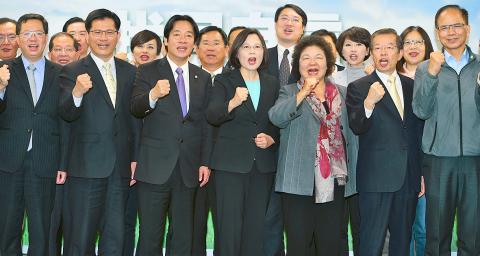Democratic Progressive Party (DPP) Chairperson Tsai Ing-wen (蔡英文) formally declared her candidacy for next year’s presidential race yesterday after receiving her party’s nomination, calling for solidarity and strength to change the nation.
“Today is an important day and I am honored to accept the DPP’s nomination to take part in the Republic of China’s next presidential election on behalf of the DPP,” Tsai, 58, told a press conference at DPP headquarters in Taipei.
Tsai’s nomination was approved at a meeting of the party’s Central Executive Committee to a round of applause shortly before the press conference.

Photo: Liao Chen-huei, Taipei Times
It will be Tsai’s second shot at the presidency, after losing to President Ma Ying-jeou (馬英九) of the Chinese Nationalist Party (KMT) in the 2012 presidential election, in which Tsai garnered 45.63 percent of the votes, while Ma received 51.6 percent.
“The night we were beaten, there were many young people crying,” Tsai said.
“Today, I want to tell you all — and myself — I will do whatever I can to turn those tears to laughter,” Tsai added.
Tsai said the development of cross-strait relations had to be subject to the will of Taiwanese and could not be undertaken as party-to-party negotiations.
“The basic principle of our party in cross-strait relations is to maintain the ‘status quo,’” Tsai said.
“After we [the DPP] come to power, we will examine agreements [with China] case by case, according to the law, and will continue negotiations,” she added.
Tsai also attacked the KMT over the nation’s growing wealth gap and growing youth unemployment, vowing to rehabilitate the nation’s economy.
“The government has shut the door on the public and refused to listen to them,” she said.
The KMT has yet to announce its nomination, but Tsai leads all the likely candidates in opinion polls.
As the DPP announced its candidate for next year’s presidential election, China yesterday warned the party to heed the lessons of the last time it was in power and not to push for independence.
“If [the DPP] upholds the Taiwanese independence splittist position of ‘one country on either side of the Taiwan Strait,’ then it will be hard to find a way out for cross-strait relations,” China’s Taiwan Affairs Office spokesman Ma Xiaoguang (馬曉光) told a regular press briefing in Beijing. “This is not a new talking point — this is what happened between 2000 and 2008. One need not look far for a lesson.”

CHAOS: Iranians took to the streets playing celebratory music after reports of Khamenei’s death on Saturday, while mourners also gathered in Tehran yesterday Iranian Supreme Leader Ayatollah Ali Khamenei was killed in a major attack on Iran launched by Israel and the US, throwing the future of the Islamic republic into doubt and raising the risk of regional instability. Iranian state television and the state-run IRNA news agency announced the 86-year-old’s death early yesterday. US President Donald Trump said it gave Iranians their “greatest chance” to “take back” their country. The announcements came after a joint US and Israeli aerial bombardment that targeted Iranian military and governmental sites. Trump said the “heavy and pinpoint bombing” would continue through the week or as long

TRUST: The KMT said it respected the US’ timing and considerations, and hoped it would continue to honor its commitments to helping Taiwan bolster its defenses and deterrence US President Donald Trump is delaying a multibillion-dollar arms sale to Taiwan to ensure his visit to Beijing is successful, a New York Times report said. The weapons sales package has stalled in the US Department of State, the report said, citing US officials it did not identify. The White House has told agencies not to push forward ahead of Trump’s meeting with Chinese President Xi Jinping (習近平), it said. The two last month held a phone call to discuss trade and geopolitical flashpoints ahead of the summit. Xi raised the Taiwan issue and urged the US to handle arms sales to

State-run CPC Corp, Taiwan (CPC, 台灣中油) yesterday said that it had confirmed on Saturday night with its liquefied natural gas (LNG) and crude oil suppliers that shipments are proceeding as scheduled and that domestic supplies remain unaffected. The CPC yesterday announced the gasoline and diesel prices will rise by NT$0.2 and NT$0.4 per liter, respectively, starting Monday, citing Middle East tensions and blizzards in the eastern United States. CPC also iterated it has been reducing the proportion of crude oil imports from the Middle East and diversifying its supply sources in the past few years in response to geopolitical risks, expanding

Pro-democracy media tycoon Jimmy Lai’s (黎智英) fraud conviction and prison sentence were yesterday overturned by a Hong Kong court, in a surprise legal decision that comes soon after Lai was jailed for 20 years on a separate national security charge. Judges Jeremy Poon (潘兆初), Anthea Pang (彭寶琴) and Derek Pang (彭偉昌) said in the judgement that they allowed the appeal from Lai, and another defendant in the case, to proceed, as a lower court judge had “erred.” “The Court of Appeal gave them leave to appeal against their conviction, allowed their appeals, quashed the convictions and set aside the sentences,” the judges